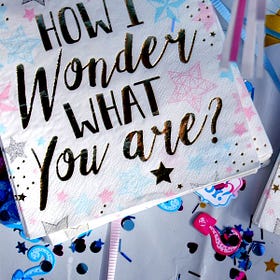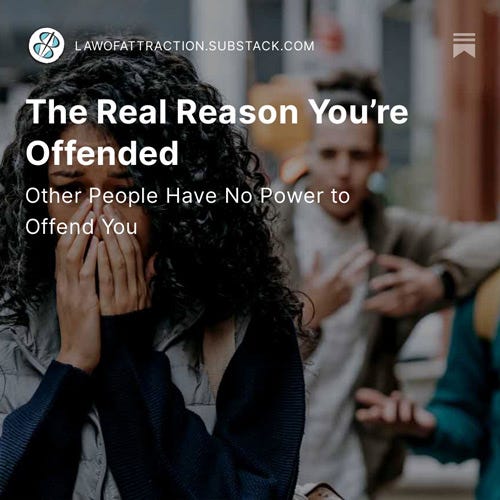Do You Believe in Your Identity?
Those who demand special pronouns don't believe in their identity.
I have been listening to this song by Lauren Daigle (which you can watch below) called “You Say.” She’s a Christian but has been criticized for going on Ellen and not calling homosexuality a sin. To that, she said, "I'm not God." She believes people can sit next to others who they disagree with and has grown a thicker skin, not minding if people misunderstand her.
I didn’t know that about her until researching for this article, but I think it fits perfectly with what my point is. Some people feel very comfortable with who they are (their identity), and others don’t.
In the song, You Say, she sings to God:
You say I am loved when I can't feel a thing.
You say I am strong when I think I am weak
And you say I am held when I am falling short
And when I don't belong, oh You say I am Yours
And I believe
Oh, I believe what You say of me
I believe
The only thing that matters now is everything You think of me
In You I find my worth, in You I find my identity.
The point of the song is that sometimes she can’t feel these things but remembers what God has said of her, that she’s loved, strong, held, and belongs in His family, and she has faith or trust that He knows these to be true and believes Him, over her own limited thoughts of herself. Her identity, to her, is tied up in what God says of her, not of what the world says of her or even what she says of herself when feeling low.
If that’s the case, then you would see her not minding other Christians criticizing her as not being Christian enough, or Christian at all (in their minds). I have some beliefs that cause Christians to call me a heretic, so I can understand that.
Motivated Reasoning Keeps Us From Changing Minds
I can argue all factory-farmed meat is meat sacrificed to idols because they harm the animals’ welfare in greed, to serve their idol/god ‘mammon’ (to make more money). So factory-farmed meat could be meat sacrificed to idols and wrong to eat according to Jesus. But most people do not want to stop eating meat. So they will tune that out, and start coming up with excuses for why I must be wrong, using the flimsiest evidence.
I, too, do not rely on what the world views me as. If I did, I would constantly be upset because the world is projecting their own faults onto others they disagree with. That’s the dehumanization they do to anyone they view as a “persecutor.” The world cannot know who you are inside. I previously wrote that I have been misgendered.
The Drama Around Pronouns & Gender Identity
Though I didn’t feel like I had been victimized, I was confused and annoyed when I got misgendered. I was confused because my name is clearly a woman’s name. I think I was annoyed because it felt like a sign that the person writing to me was projecting their own views of who I am onto me. They weren’t seeing the actual me. And if anyone who has been misgendered (and gotten upset about it) is reading that, it’s probably how they feel too.
Demanding Non-Biological Pronouns
What struck me while listening to the song was how completely opposite it must be for those who don’t just prefer you to use their “preferred pronouns” but demand it. There is likely no comfort for them in knowing who they are inside. How could there be? They look to other people to “affirm” their identity to them. If you ever give the responsibility to feel comfortable in who you are to other people, you will be sorely disappointed.
We can’t even feel comfortable with ourselves all of the time. That’s the benefit of trusting God’s higher perspective on us rather than our own limited perspective on ourselves. You can hear the power she emanates while singing. There is such power in believing what God says about you, that you’re loved, strong, and held, and belong with Him. It’s satisfaction. That is truly satisfying. There is no longer a hole in your soul that you need anyone else’s opinion on you to fill, than His opinion.
Those who want other people to “affirm” their worth, “affirm” their identity, will never be satisfied. They’re looking for love in all the wrong places. It has to come from within, not without, not from the world.
And, I am not saying you need a belief in God to feel satisfied in who you are. An atheist can have trust in themselves and have an identity and not mind what other people say about them, because they know others don’t truly see them as they are. I wrote about why people get offended, and it’s about their own beliefs.
If you truly believed in your “gender identity” and got “misgendered” you would not care if you didn’t have a belief deep inside that they might be right, and you might be wrong. The negative feeling of getting “offended” shows that you don’t feel confident in your belief.
If someone says that I’m a heretic, I don’t care. Because I am confident in my identity as a follower of Christ. What they think about me doesn’t matter a bit. If people fall to pieces because another “misgenders” them, it proves they don’t believe in their identity. It proves they’re looking for other people’s “affirmation” or “approval,” but that will never satisfy them.
To believe in your identity is to stop looking to the world to “affirm” it. Anyone who does is basically looking for others to “save” them from feeling not seen. I wish they could find the peace that comes from finding your identity from within, rather than without (from the world), because they will never find peace that way.






That's 100% right on the money.
The same goes for all those screwy diversity training classes. They can all be condensed down to, "Live your life trying to *not* offend people based on their race, while simultaneously *not* identifying their race -- because that's racist." It's nonsense first of all. Second, you will live a completely hollow life trying to please others all the time. It will sap your energy and leave you beaten and defeated.
Diversity training is about teaching you to hate yourself, and setting you up for failure. It's truly mind-fuckery.
People need to find their identity like Barbara said -- from within, or from God. Everything else is a path to ultimate failure. It's a string of never ending goal post movements.
You might find some actionable items here.
Woke Self-Defense 101
Fight Wokeness & Be the Life of the Party
https://yourunclepedro.substack.com/p/woke-self-defense-101